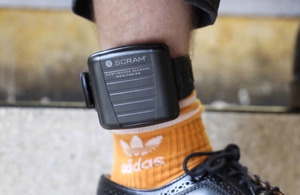Record number of offenders facing sober Christmas and New Year
A record number of offenders with alcohol problems will be forced to stay dry this festive season in a bid to cut booze-fuelled crime over Christmas.

-
Around 2800 offenders wearing alcohol tags to stop them drinking over Christmas period
- Mulled wine and eggnog off the menu to cut booze-fuelled crime
- Offenders banned from alcohol have stayed sober for 97% of the time on average
Statistics released today (Friday 29 December) show around 2800 offenders have been made to wear an alcohol tag during Christmas and New Year, with the devices able to detect if an offender has been drinking by analysing their sweat.
This is an increase of around 1000 offenders from the same time last year and follows the Government’s drive to double the number of people on tags at any one time by 2025 and protect communities from the violence and disorder often caused by alcohol.
If an offender has had a drink an alert will be sent to the probation officer who can take action. The tags are so accurate they won’t be triggered by foods that contain alcohol –but boozy drinks will raise the alarm and offenders face being sent to prison.
The Government’s investment will nearly double the number of defendants on tags at any one time from 13,500 in 2021 to 25,000 by 2025.
Around 39% of all violent crime in the UK involves alcohol, including domestic abuse which can rise during the festive period as figures provided by charities such as Women’s Aid have often demonstrated.
Lord Chancellor and Justice Secretary, Alex Chalk KC, said:
“The festive season is a time of celebration but a small minority can take it too far. We’re keeping communities safe by tagging a record number of offenders this Christmas period.
“These innovative alcohol tags act as an important deterrent to offenders and come with a clear message: step out of line and you could end up behind bars.”
Alcohol tags are part of the Government’s unprecedented £156 million investment in tagging technology which means the UK has remained among the world leaders in the use of tags to fight crime and keep people safe.
The tags were first rolled out in 2020 as a punishment for alcohol-fuelled crimes and are also used to help keep the public safe from offenders considered likely to commit crimes when drunk.
Roughly 20% of offenders on probation are classed as having a drinking problem, so these tags play a part in helping to cut alcohol-fuelled crime, which causes untold misery for victims and lands society with a £21 billion bill each year.
Offenders banned from alcohol by the courts have stayed sober for 97% of the time on average, showing that these tags are successfully working as a deterrent.
Further information
- Statistics show offenders on community orders are complying with alcohol bans for 97% of the time
- The Crime Survey indicated that 39% of victims of serious offences believed that alcohol played a factor in the incident
- Statistics show that around 20% of offenders managed in the community by the Probation Service had an identified “alcohol need”
- Figures have shown year on year that the percentage of domestic abuse-related offences increases in December